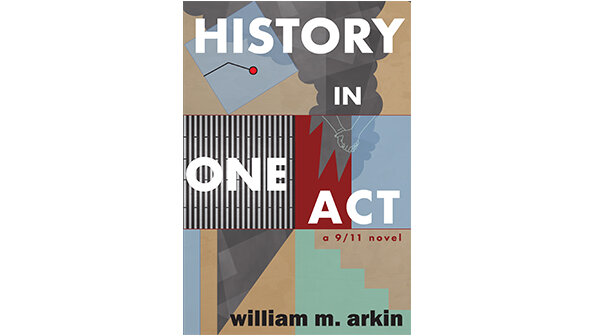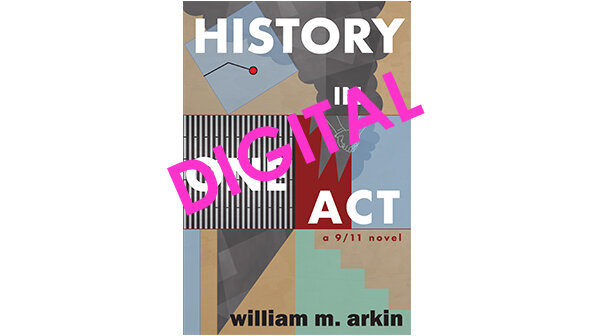A selection from the prologue of HISTORY IN ONE ACT
Las Vegas, June 28, 2001
Mohammed Atta finished his silent prayer and opened his eyes just as the airliner jerked to a stop at the jet way, getting up to retrieve his gym bag from the overhead bin, zipping his notebook into its outer pocket. Sitting in Seat 1C, he was the first to disembark from United Airlines Flight 955 at McCarran International Airport.
“Have a good day,” the flight attendant said as Atta passed her.
“And good luck.”
Dressed in jeans and a white short-sleeved button-down shirt, he looked like any other tourist.
Except. Except that the first-class attendant thought she had failed to make her charge comfortable, failed to make conversation, even failed in offering him a drink, even water. Mr. Mohammed Atta, not a MileagePlus member according to her passenger manifest, had written in his notebook the entire flight. And his eyes, she thought, weren’t those of your typical visitor to Las Vegas—that is, if she could even say anything about his eyes, having had an almost impossible time making any contact with him.
Marwan teased Atta about those eyes ever since he cut his beard, that his piercing stare was the first thing most people noticed about him. His friend urged him to mix it up more: to soften his face and look at people with a pleasant expression—to not hold his mouth so permanently set in a scowl, to smile more, even if it was only for the cause.
On the tram to the airport’s main terminal, Atta stared out at the rim of mountains and the endless vista that surrounded the desert city. The sun beat down on the air-conditioned train and Atta craned his neck to take in the casinos in the far distance. He’d read that Las Vegas sprawled to the foothills on all sides, that it had been plopped in the middle of the desert by mobsters, that it had no real reason to be where it was—no river, no port, no crossroads even—sort of a metaphor for America, Atta thought: lost in blank and empty geography.
Getting off the tram, Atta followed the signs towards the shuttle buses. Riding the escalator down to the cavernous arrival hall, he immediately was assaulted. Every wall and pillar was swathed in too-colorful advertisements: gaudy hotels made up in garish themes, luxury this and that perfume, watches, luggage, automobiles. A blond and effeminate Siegfried and Roy humping a giant white tiger. Naked Cirque d’Soleil dancers contorted into depraved sexual poses. There were comedians with orange hair. And various musical troupes dressed up like women.
Thinking that if Germany was the land of pink, Las Vegas was hot pink.
Prying himself away from this cacophonous inferno, he lurched outside. Though it was over 100 degrees Fahrenheit, he also cooled, and he felt free, breathing in the glorious heat, finding the bus stop, patiently waiting for a ride to the Alamo Company while smoking a Marlboro Light.
When Atta presented the address of his motel at the exit of the rental car garage, the document checker suggested he take I-15 north. Atta said he wanted instead to drive the strip, Las Vegas Boulevard.
The man in the blue polo shirt ticked off another in his mental tabulation as to how many preferred to inch their way along that famous street. He pointed to the massive Mandalay Bay hotel and casino, visible and looming even though it was more than a mile away from the airport, telling the visitor to take a left and drive back towards the airport until he saw signs for the exit and then a right towards the airport exit road, making a gesture with his hand like an airplane banking to the right.
“Good luck,” he said.
Good luck!
That seemed to be the greeting, the absent-minded Las Vegas version of As-salamu Alaikum. The shuttle bus driver said it as well.
Driving north on the boulevard, Atta passed the famous sign welcoming all to the city of sins and dreams. He passed the ridiculous black pyramid-shaped Luxor casino, then the castle-themed Excalibur, dressed up in red- and gold-topped crusader towers.
His car windows wide open, Atta plunged into increasingly dense traffic, passing a drab-looking (given its name) Monte Carlo. Then there was the vaguely Middle Eastern-themed Aladdin on his right, with its taunting minarets. Then Paris. He waited for the light to turn green at the corner of Bally’s and Bill’s Western Saloon, gazing at the famous Caesar’s Palace across the street, a landmark that stood out like the center square of an absent-minded Christian celebration.
He’d read in the inflight magazine that the city was a “mecca” for American and international tourists, an oblivious reference and yet another affront to his people and his religion.
There was only one Mecca and only one God.
Driving past the Mirage, Treasure Island and then the Fashion Showcase shopping mall, the boulevard gave way to mere thoroughfare, what Atta thought must be considered the “back of the plane"—second, third, fourth, and even fifth class of Las Vegas—each stretch of road a cheaper and cheaper ghetto, the billboards now hawking wedding chapels with fantasy themes, betting parlors claiming better odds, restaurants with one-dollar eats, and American redneck entertainment suitable for the lowest of the low rollers.
Then the upscale displays disappeared altogether. Now the boulevard was populated with gaudy gift shops—the largest gift shop in the world! 25,000 gifts! The Las Vegas strip abruptly ended at the forlorn and crumbling Sahara hotel and casino.
A magic carpet ride said the guidebook.
Sayyid Qutb nailed it more than 50 years earlier, Atta thought. “What is its worth—this America—in the scale of human values?” Qutb wrote,
“And what does it add to the moral account of humanity? And, by the journey’s end, what will its contribution be?
I fear that a balance may not exist between America’s material greatness and the quality of its people. And I fear that the wheel of life will have turned and the book of time will have closed and America will have added nothing, or next to nothing, to the account of morals that distinguishes man from object, and indeed, mankind from animals.”
Atta read the great Egyptian intellectual when he was a university student. He was doubly impressed because Qutb had written before oil began to burn in every heart, before civilizations collided and the pious vanguard went to make jihad in the mountains.
Since being in America, Atta found himself seeing the same thing. He saw it in towering and perverted Manhattan, with its colossal structures. He saw it in flattened, racist Oklahoma. He saw it in the mind-numbing sprawl and stench of northern New Jersey. He saw it in the dead sameness of Florida and the endless indistinguishable highways and developments of everywhere and nowhere, even here in an American fantasyland built in the desert.
What was America worth? What did it believe?
Things. Status. Dreams of being a millionaire. But little more.
His friend Ziad drove Atta crazy with his teasing about the allure of Las Vegas, saying that even he would be crushed there.
And Ziad insisted before Atta left Florida on playing him a song by the American star Elvis Presley, a man famous in Sin City, he said. Atta hated music, but he especially hated this affront, its “There is no God, but God,” its talk of love. Except for that one line, that without love “There'd be no birds, No planes to sail in the blue…”
Since coming to America, Atta hardened, everywhere feeling the enemy of God whispering. It wasn’t just in the cultural blindness to the very existence of Islam. It wasn’t just in the gross excess. It was in its devious allure—all that was in fact attractive about this bumbling colossus, all that had stolen the hearts and the wealth and the culture of his own people.
Ziad teased Atta as he always did about the allure—that Satan would eventually get a hold of him and burrow into Atta’s consciousness like a tick, that he would pleasure him until there was no Islam left.
If it weren’t also for the fact that Ziad was the only one who understood Atta’s twin desires, and that his friend also argued that there was no Satan, Atta might have felt shame. But his Lebanese brother also argued that there was no hell. And no heaven either. He argued that the word of the Prophet—peace be upon him—was only his word. He even went as far as to say that his word wasn’t even the word of God. That God wasn’t some voice. Ziad said that to think that there were some cast of characters residing in the clouds was the wrong way to read their religion.
It was such blasphemy, that God didn’t speak to the Prophet—peace be upon him. If Ziad didn’t argue it so persuasively, if he weren’t so smart, if he weren’t his true brother, he would have never listened. In fact, he would have had nothing to do with him.
And so he tolerated Ziad speaking openly of pleasure, and action, and he struggled in conversations about what they were doing and why they were doing it, going over it again and again as they prepared.
Return to the book page for History in One Act
Downloadable preview coming soon
Other books you might enjoy





